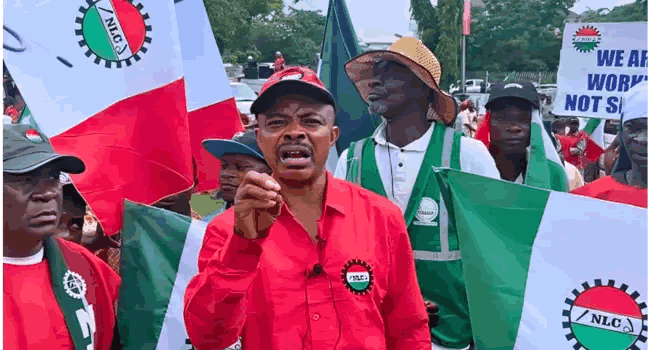For the second consecutive day, the ongoing tripartite negotiations on the new national minimum wage between the Federal Government, organized labour, and the Organised Private Sector (OPS) ended without a resolution. Imo State Governor, Hope Uzodimma, attended the meeting, which has been adjourned to Tuesday, May 28, 2024.
Initially, organized labour reduced its wage demand from ₦615,000 to ₦500,000, and subsequently to ₦497,000. In response, the OPS raised its offer from ₦54,000 to ₦57,000. The government’s negotiating team, which had been firm on its earlier offer, took a short break for consultation and returned with an increased offer of ₦57,000 to match the OPS proposal. Previously, the government had proposed a minimum wage of ₦54,000.
Sources indicate that the government team added ₦3,000 to its initial offer after consultations. However, both the government and OPS’s fresh offers were promptly rejected by the labour negotiating team, which accused them of being unwilling to negotiate earnestly.
A source close to the negotiations revealed that the government acknowledged the NLC’s evidence-based presentation but cited non-compliance with the 2019 minimum wage by eight states and a lack of funds. The government also mentioned the private sector’s inability to meet higher wage demands.
Despite the labour’s attempt to compromise by lowering their demand to ₦500,000, the government’s argument about financial constraints and the private sector’s payment capabilities did not sway the labour leaders. An inside source expressed frustration: “The government cannot keep telling us there is no money. This is an insult. The government created this problem with the removal of subsidies and the floating of the naira.”
Labour leaders criticized the government for mismanaging funds, highlighting expenditures such as N160 million given to each National Assembly member for car purchases, N90 billion for hajj subsidies, renovations of Senate chambers, and luxury vehicle purchases for customs and government officials. They argued that while the government claimed financial hardship, it was spending lavishly on political elites.
The Organised Labour, comprising the Nigeria Labour Congress (NLC) and the Trade Union Congress (TUC), firmly rejected the Federal Government’s revised offer of a ₦57,000 minimum wage. This marked the third proposal within a week to be turned down by labour representatives.
A member of the Tripartite Committee disclosed that while the Federal Government and OPS proposed a ₦57,000 monthly minimum wage, labour shifted from their initial demand of ₦615,000 to ₦497,000. The Organised Labour had previously withdrawn from negotiations, accusing the government and OPS of reluctance to settle on a new wage.
With the negotiations set to resume and no agreement in sight, the committee faces a tight deadline as the labour unions have given the government until May 31 to finalize the new minimum wage.


